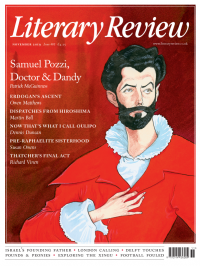Lucy Moore
Objects in the Rear-View Mirror
The Pulse Glass, and the Beat of Other Hearts
By Gillian Tindall
Chatto & Windus 275pp £16.99
The Pulse Glass opens with Gillian Tindall’s account of sprinkling the ashes of her younger brother beside a defunct railway line near where they had lived as children, and closes with an account of his death – which is much more uplifting than it might sound, being elegiac rather than depressing. It’s a family memoir encompassing tragedy and devotion, resentment and grief, misunderstanding, empathy and love, as all family histories do. But because it’s by Tindall, it’s much more than this: other themes run through the book (railways being just one of them) and a great store of social history appears, from early Christianity to the myth of King Arthur to the East End in the 1930s, all united by a scholarly yet moving contemplation of the past and how it survives or slips away.
Tindall remembers, as she writes about her brother’s birth, the woven orange blanket in which he was wrapped, which had been sent to her mother from Orkney by an aunt. ‘Such presents were valuable and prized, in 1946,’ she writes, a note of regret or reproach in her voice. This blanket endured the catastrophe that hit her family nine years later. As a young woman, Tindall wore it as a shawl; it swaddled her first son, and later his first son, ‘but somehow between his infancy and the birth of another one four years later it disappeared, perhaps to some other, unknown baby’.
Objects, like people, eventually disappear, but some have a longer life than others: ‘Here and there a locket survives, a little battered, containing a curl of who-knows-whose hair; or a Bible, worn with use, inscribed with forgotten names; or some silver spoons, thinned with use – generations of

Sign Up to our newsletter
Receive free articles, highlights from the archive, news, details of prizes, and much more.@Lit_Review
Follow Literary Review on Twitter
Twitter Feed
Under its longest-serving editor, Graydon Carter, Vanity Fair was that rare thing – a New York society magazine that published serious journalism.
@PeterPeteryork looks at what Carter got right.
Peter York - Deluxe Editions
Peter York: Deluxe Editions - When the Going Was Good: An Editor’s Adventures During the Last Golden Age of Magazines by Graydon Carter
literaryreview.co.uk
Henry James returned to America in 1904 with three objectives: to see his brother William, to deliver a series of lectures on Balzac, and to gather material for a pair of books about modern America.
Peter Rose follows James out west.
Peter Rose - The Restless Analyst
Peter Rose: The Restless Analyst - Henry James Comes Home: Rediscovering America in the Gilded Age by Peter Brooks...
literaryreview.co.uk
Vladimir Putin served his apprenticeship in the KGB toward the end of the Cold War, a period during which Western societies were infiltrated by so-called 'illegals'.
Piers Brendon examines how the culture of Soviet spycraft shaped his thinking.
Piers Brendon - Tinker, Tailor, Sleeper, Troll
Piers Brendon: Tinker, Tailor, Sleeper, Troll - The Illegals: Russia’s Most Audacious Spies and the Plot to Infiltrate the West by Shaun Walker
literaryreview.co.uk